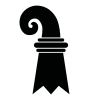
Back Kanton Basel-Stadt Afrikaans Kanton Basel-Stadt ALS Cantón de Basilea-Ciudat AN كانتون مدينة بازل Arabic Basilea-Ciudá AST بازل اشتاد (کانتون) AZB Kanton Basel-Kota BAN Базель-Штат Byelorussian Базэль-Штат BE-X-OLD Базел Щат Bulgarian
Canton of Basel-Stadt
Kanton Basel-Stadt (German) Canton of Basel-City | |
|---|---|
 | |
 Basel-Stadt highlighted in Switzerland, with the special marker | |
| Coordinates: 47°34′N 7°36′E / 47.567°N 7.600°E | |
| Capital | Basel |
| Subdivisions | 3 municipalities |
| Government | |
| • Executive | Executive Council (7) |
| • Legislative | Grand Council (100) |
| Area | |
• Total | 36.95 km2 (14.27 sq mi) |
| Population (July 2021)[2] | |
• Total | 201,156 |
| • Density | 5,400/km2 (14,000/sq mi) |
| GDP | |
| • Total | CHF 37.168 billion (2020) |
| • Per capita | CHF 189,354 (2020) |
| ISO 3166 code | CH-BS |
| Highest point | 522.19 m (1,713 ft): St. Chrischona |
| Lowest point | 244.75 m (803 ft): Rhine shore, national border at Kleinhüningen |
| Joined | 1501 |
| Languages | German |
| Website | www |
Basel-Stadt or Basel-City (German: Kanton Basel-Stadt [ˌbaːzl̩ˈʃtat] ⓘ; Romansh: Chantun Basilea-Citad; French: Canton de Bâle-Ville [bɑl.vil]; Italian: Canton Basilea Città) is one of the 26 cantons forming the Swiss Confederation. It is composed of three municipalities with Basel as the capital. It is traditionally considered a "half-canton", the other half being Basel-Landschaft, its rural counterpart.
Basel-Stadt is one of the northernmost and lowest cantons of Switzerland, and the smallest by area. The canton lies on both sides of the Rhine and is very densely populated. The largest municipality is Basel, followed by Riehen and Bettingen. The only canton sharing borders with Basel-Stadt is Basel-Landschaft to the south. To the north of Basel-Stadt are France and Germany, with the tripoint being in the middle of the Rhine.
Together with Basel-Landschaft, Basel-Stadt was part of the Canton of Basel, who joined the Old Swiss Confederacy in 1501. Political quarrels and armed conflict led to the partition of the canton in 1833.
Basel-Stadt is Switzerland's seventh-largest economic centre[4] and has the highest GDP per capita in the country, ahead of the cantons of Zug and Geneva (in 2018).[5] In terms of value, over 94% of Basel City's goods exports are in the chemical and pharmaceutical sectors. With production facilities located in the neighbouring Schweizerhalle, Basel accounts for 20% of Swiss exports.[6]
- ^ Arealstatistik Land Cover - Kantone und Grossregionen nach 6 Hauptbereichen accessed 27 October 2017
- ^ Canton of Basel-Stadt Statistics, MS Excel document – T01.0.01 - Bevölkerungsstand 31 July 2021 numbers (in German) accessed 21 September 2021
- ^ Statistik, Bundesamt für (21 January 2021). "Bruttoinlandsprodukt (BIP) nach Grossregion und Kanton - 2008-2018 | Tabelle". Bundesamt für Statistik (in German). Retrieved 1 July 2023.
- ^ Office, Federal Statistical. "Gross domestic product per canton and region". www.bfs.admin.ch.
- ^ "Schweiz - Bruttoinlandsprodukt pro Kopf nach Kanton 2018". Statista.
- ^ "Archived copy" (PDF). www.credit-suisse.com. Archived from the original (PDF) on 3 June 2016. Retrieved 11 January 2022.
{{cite web}}: CS1 maint: archived copy as title (link)


